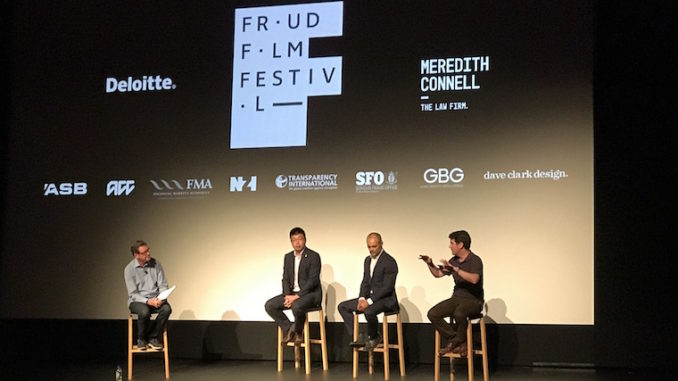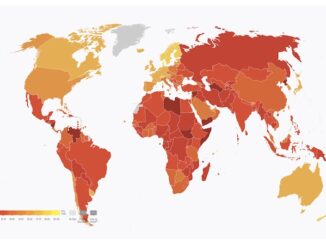
Auckland’s ASB Waterfront Theatre recently played host to a film festival with a difference. NZSM caught up with Ian Tuke, Chair of the NZ International Fraud Film Festival to find out more about this most unlikely pairing of fraud and film.
For two days in early March, the Fraud Film Festival descended upon Auckland’s Wynyard Quarter, delivering an international line-up of films and documentaries about fraud and its prevention. Audiences engaged in live discussions and Q&A sessions with experts aimed at inspiring awareness and debate around issues of dishonesty and misconduct.
Fraud, as the festival organisers remind us, is big business. The earnings are high, as are the risks. By showing films and documentaries and engaging in conversations, the festival aims at bringing this complex and intriguing subject to the attention of a large audience.
New Zealand International Fraud Film Festival is affiliated with the Dutch Fraud Film Festival, which was first held in the Netherlands in 2014.
Chance beginnings
Ian Tuke, the Film Festival’s Chair, is a Partner in Forensics at Delloite. “There’s 33 of us in our team that investigate fraud, misconduct and corruption every day of the week and we spend a lot of time doing prevention and detection work as well,” he told NZSM.
“I received an email saying that our colleagues in the Netherlands organise a fraud film festival that’s open to the public. I dug into it, contacted the guys in the Netherlands and a month later went to the event in Amsterdam to watch it first-hand.
“I was blown away by the whole concept, the professional way in which it was delivered, and most importantly the quality of the conversations that happened outside of the documentaries and the panel Q&As.
The inaugural NZ event was held the end of 2016, attracting more than 400 cinema goers. The feedback was so good that Ian and colleagues felt compelled to run another event this year.
According to Ian, the festival has two overarching objectives. “The first is to foster better industry collaboration around raising the public awareness of fraud and getting public and private working together to collaborate on initiatives. The second focuses on frauds that affect the public and increasing awareness of – and therefore protection from – these.”
Collaboration is the focus of Day One of the festival. “On the thursday we had 250 to 300 senior executives and financial crime practitioners in the same room watching documentaries, followed by really grunty panels and Q&A afterwards, followed by 300 people spilling out to chat about what they’d just seen and heard.”
On Day Two, the festival flung its doors open to the public in order to achieve its aim of increasing a more general public awareness of fraud.
Enjoying this article? Consider a subscription to the print edition of New Zealand Security Magazine.
The NZ fraud threat-scape
According to Ian, the key fraud issues practitioners are facing in New Zealand are a mix of new and old.
“A continuing theme is invoicing fraud – trusted senior manager sets up supplier and produces invoices for stuff that hasn’t happened and approves it themselves,” he explained. “Typically, they make a few hundred grand before they get caught, and they’re just the ones we know about.”
Theft and abuse of commercially sensitive information by outgoing personnel going to competitors or setting up in competition – taking the crown jewels with them – is among the new and emerging issues. “There are so many ways of getting information out that it creates challenges for businesses to detect and prevent that stuff from happening.”
Enjoying this article? Consider a subscription to the print edition of New Zealand Security Magazine.
“If you think about all the electronic devices that touch on your core business, the security of information is pretty patchy across New Zealand. It’s a real balance between locking everything down so nobody can do anything and having things completely open to abuse.”
Ian’s team at Delloite are also seeing a lot of technology-enabled fraud, including cyber. “We’re still seeing people manipulating electronic payments – messing with online payment systems, changing supplier names and loading dodgy payments.”
There’s also been a spate of collusion around procurement fraud, triggered by ongoing high volumes of infrastructure builds, particularly in Auckland, Christchurch and Wellington.
“With that much money washing around we are seeing issues emerge around manipulation of tender processes and collusion with suppliers – employees within the business colluding with supplier so that they’re paying too much for goods and services around capital works or procurement.
“Historically in New Zealand people act alone, but in the last three to five years we’ve seen a bump in two or more people acting together to do the wrong thing.”
More disciplines needed
Ian’s team has tripled in the last six years. “We’ve needed more skills sets to respond to financial crime,” he explained. “Historically we may have had investigators, accountants and computer forensics, but now we need statisticians and data scientists, discovery experts, financial crime prevention and detection specialists and lawyers.”
“To remain relevant and to grow, we’ve had to add all these extra skills into our team. Our clients want us more and more to get involved in prevention and real time detection.
“Statisticians look at what’s been happening over the last few years and model where things might be heading. Historically it’s been about old data and seeing what happened, but the way of the future is getting ahead of it and seeing what’s coming and putting things in place to either stop it or pick it up nice and quickly.”
Not surprisingly, the focus on data analysis has been accompanied – and supported – by the use of machine learning. “This is where we might have a million emails to look at and we get the machine to show us where the clusters of themes are.”
“It will tell us what it thinks is going on, the humans will go in there and test those theories, adjust them and get the machine to go away and do some more analysis. Then we’ll check again and see if they’ve got the approach right, tweak it and repeat, and then once we’re satisfied it’s got it nailed then it goes away and pulls out the relevant stuff for us to look at.
“It’s not quite artificial intelligence, but it’s on that journey.”
The next Fraud Film Festival is scheduled to take place somewhere around August to November next year at the ASB Waterfront Theatre.









